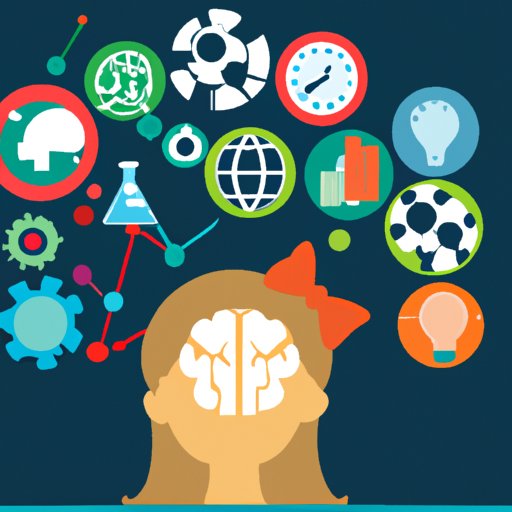Introduction
Scientific literacy is defined as having “the knowledge and understanding of scientific concepts and processes required for personal decision making, participation in civic and cultural affairs, and economic productivity” (National Academy of Sciences, 1998). In today’s world, scientific literacy is necessary to understand how science affects our everyday lives, from the food we eat to the technology we use. It is also important to understand the impact of science on our planet and how it can help us solve global challenges.
Career Opportunities with a Science Background
Having a background in science can open up a variety of career paths. For example, those with a degree in biology or chemistry can pursue careers in the medical field, such as becoming a doctor, nurse, or physician assistant. Those with a physics or engineering degree may find themselves working in the tech industry, developing new products and technologies. There are also many opportunities in the environmental sciences, such as researching renewable energy sources or studying climate change.
A background in science can also provide unique job opportunities outside of traditional fields. For example, there are positions available in marketing, communications, and public relations for those with knowledge of scientific concepts. There are also opportunities in education, journalism, and policymaking for those who have the skills to communicate scientific information to broader audiences.
According to a survey conducted by Pew Research Center, employers are increasingly looking for workers with science-related skills, such as data analysis, computer programming, and problem-solving. Having a background in science can give you an edge in the job market and open up more opportunities for you.

Scientific Breakthroughs and Their Potential to Benefit Humanity
Scientific breakthroughs are happening all the time, from new treatments and therapies for diseases to advances in space exploration. These breakthroughs can have a huge impact on humanity, from improving our quality of life to helping us better understand our universe. For example, the development of the polio vaccine in the 1950s led to a dramatic decrease in cases of the disease, saving millions of lives. More recently, scientists have developed a new gene-editing technique called CRISPR, which has the potential to revolutionize medicine and agriculture.
In addition to improving our quality of life, scientific breakthroughs can also help us tackle global challenges. For example, scientists are researching new technologies that can be used to reduce carbon emissions and combat climate change. They are also exploring ways to increase access to clean water and create sustainable sources of energy. By staying up to date on the latest scientific breakthroughs, we can better prepare ourselves for the future.
Logical Thinking Skills Developed Through Studying Science
Studying science helps develop logical thinking skills, which can be useful in all aspects of life. Scientific research involves carefully analyzing data and drawing conclusions based on evidence. This type of thinking can help you make informed decisions and solve problems more effectively. It can also help you become a better communicator, as you will be better able to explain your ideas and arguments in a clear and organized way.
If you want to hone your logical thinking skills, there are several things you can do. First, practice breaking down complex problems into smaller, more manageable parts. Next, take the time to really think through each step of the problem-solving process. Finally, ask yourself questions about the data and evidence you are presented with in order to come to the most accurate conclusion.

Creativity and Innovation from Scientific Research
Creativity and innovation are essential for scientific progress. Scientists often have to come up with creative solutions to difficult problems and think outside the box when designing experiments. This type of creative thinking can lead to unexpected discoveries and advancements in our understanding of the world. For example, the discovery of penicillin was an accidental result of a scientist’s creative experimentation.
Innovation is also key for tackling global challenges. Scientists are constantly coming up with new ways to use existing technologies and resources to address problems such as poverty, inequality, and climate change. For example, engineers are developing new ways to generate clean energy, while biologists are creating new medicines and treatments for diseases.

Solving Global Challenges with Science
Science has the potential to help us solve some of the biggest global challenges we face today. From poverty to climate change, science can provide us with the tools we need to make real progress. For example, advances in renewable energy technologies can help us reduce our reliance on fossil fuels and reduce our impact on the environment. In addition, scientific research can help us better understand and address issues such as poverty, inequality, and access to healthcare.
To make progress in these areas, it is important to invest in scientific research and promote collaboration between scientists, governments, and businesses. We must also ensure that everyone has access to high-quality education and training so they can gain the skills they need to contribute to scientific progress.
Conclusion
Learning science is important for everyone in today’s world. From career opportunities to solving global challenges, science has the potential to benefit humanity in many ways. Studying science can also help develop logical thinking skills, foster creativity and innovation, and equip us with the tools we need to make real progress. By understanding the importance of science and its potential to benefit humanity, we can make the world a better place.
(Note: Is this article not meeting your expectations? Do you have knowledge or insights to share? Unlock new opportunities and expand your reach by joining our authors team. Click Registration to join us and share your expertise with our readers.)
